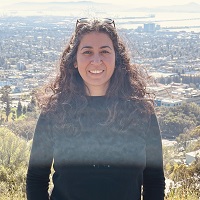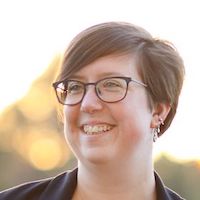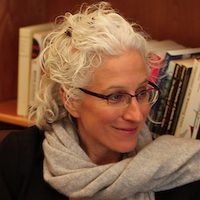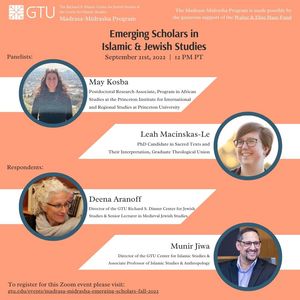Madrasa-Midrasha Emerging Scholars Colloquium
Please join the GTU's Madrasa-Midrasha Program for an online event featuring the work of current GTU students researching topics in Islamic Studies and Jewish Studies. Presenters include Leah Macinskas-Le, a doctoral candidate in the Department of Sacred Texts and Their Interpretation at the GTU, and May Kosba, Postdoctoral Research Associate in the Program in African Studies at the Princeton Institute for International and Regional Studies (PIIRS) at Princeton University and graduate from the Historical and Cultural Studies of Religion at the GTU.
Macinskas-Le's talk is titled "Sectarian Rhetoric of Torah Observance in the Gospel of Matthew and the Dead Sea Scrolls" and will explore how Torah observance (or halakhah to use the later Hebrew term) became a location of sectarian division and debate in the Second Temple period. Macinskas-Le's research focuses on the Gospel of Matthew and some of the Dead Sea Scrolls (4QMMT, the Damascus Document, among others) to examine how this rhetoric was used to enforce in-group/out-group dynamics and polemical content.
Dr. Kosba's talk is titled "The Race Question in the Egyptian Intellectual Tradition." Since the colonial period, Egyptians have struggled to negotiate their identities against European notions of a “civilized” whiteness and an “inferior” blackness. And the triple impact of an Islamic empire, Western colonialism, and Arab nationalism has deeply shaped their perceptions of race and Blackness. The rise of Egyptian nationalism in the late 19th century promoted a civic culture with an affinity for whiteness along with a repudiation of colonial dominance. In their response to colonialism, Egyptian nationalists reacted by forging their own ideas of a superior “self” and an inferior “Other.” While this included a search for the survival and continuity of ancient Egyptian culture sometimes referred to as “Pharaonism,” they failed to recognize their country’s socio-cultural and political ties with the African continent, causing Egypt's alienation and detachment from Africa and the African Diaspora. In this presentation, I show that in order to understand the complexity of identity formation among contemporary Egyptians, we must grasp how the interlocking legacies of the Arab conquest, Ottoman rule, and Western European colonialism impacted Egyptian nationalists’ identity and thought in the 19th and 20th centuries. This period and its enduring legacy may have shaped the contours of Egyptian identity and race consciousness today, but it can be understood as an accumulation of ideas through time. Tracing key historical threads of race and Islam through the lens of Walter Benjamin’s theory of time helps us think of the complexity of modern Egyptian identity as non-fixed, oscillating back and forth between two dichotomous Black and White worlds.
Watch the Program Here
Panelists:
 May Kosba is a Postdoctoral Research Associate in the Program in African Studies at the Princeton Institute for International and Regional Studies (PIIRS) at Princeton University. She holds a doctoral degree from the Historical and Cultural Studies of Religion and an M.A. in Islamic Studies from the Center for Islamic Studies at the Graduate Theological Union in Berkeley, California. Centering Egypt as an imagined African geographical space in the Black and non-Black African novel, her project engages the African continent in ways that expand beyond the Atlantic, and investigates the role of religion and Arab nationalism in Black and non-Black African subject formation using the novel as a site of cultural and historical memory, and a vehicle for knowledge production.
May Kosba is a Postdoctoral Research Associate in the Program in African Studies at the Princeton Institute for International and Regional Studies (PIIRS) at Princeton University. She holds a doctoral degree from the Historical and Cultural Studies of Religion and an M.A. in Islamic Studies from the Center for Islamic Studies at the Graduate Theological Union in Berkeley, California. Centering Egypt as an imagined African geographical space in the Black and non-Black African novel, her project engages the African continent in ways that expand beyond the Atlantic, and investigates the role of religion and Arab nationalism in Black and non-Black African subject formation using the novel as a site of cultural and historical memory, and a vehicle for knowledge production.
 Leah Macinskas-Le is a PhD student in the Department of Sacred Texts and Their Interpretation at the Graduate Theological Union in New Testament and Rabbinics. Her research interest is the socio-rhetoric of Jewish sectarian halakhic debates in the Second Temple period, especially the Gospel of Matthew and the Dead Sea Scrolls. Leah has a BA in Classics and Critical Theory from McGill University, a Master of Divinity from Princeton Theological Seminary, and a Master of Arts in Ancient Judaism from the Jewish Theological Seminary of America.
Leah Macinskas-Le is a PhD student in the Department of Sacred Texts and Their Interpretation at the Graduate Theological Union in New Testament and Rabbinics. Her research interest is the socio-rhetoric of Jewish sectarian halakhic debates in the Second Temple period, especially the Gospel of Matthew and the Dead Sea Scrolls. Leah has a BA in Classics and Critical Theory from McGill University, a Master of Divinity from Princeton Theological Seminary, and a Master of Arts in Ancient Judaism from the Jewish Theological Seminary of America.
Respondents:
 Deena Aranoff is Faculty Director of the Richard S. Dinner Center for Jewish Studies at the Graduate Theological Union in Berkeley, CA. She teaches rabbinic literature, medieval patterns of Jewish thought, and the broader question of continuity and change in Jewish history. Her recent publications engage with the subject of childcare, maternity and the making of Jewish culture.
Deena Aranoff is Faculty Director of the Richard S. Dinner Center for Jewish Studies at the Graduate Theological Union in Berkeley, CA. She teaches rabbinic literature, medieval patterns of Jewish thought, and the broader question of continuity and change in Jewish history. Her recent publications engage with the subject of childcare, maternity and the making of Jewish culture.
 Munir Jiwa is the Founding Director of the Center for Islamic Studies and Associate Professor of Islamic Studies and Anthropology at the Graduate Theological Union, and serves as a faculty at the Othering and Belonging Institute’s Religious Diversity Cluster at UC Berkeley. His research interests include Islam and Muslims in the West, Islamophobia studies, media, art and aesthetics, secularism, religious formation and leadership, religion in the public sphere, and interreligious and theological education. He is the recipient of foundation awards and grants from the Andrew Mellon Foundation, Carnegie Corporation of New York, Ford Foundation, Henry Luce Foundation, Social Science Research Council, and the Walter and Elise Haas Fund. From 2019-2021 he served as the Chair of the Committee on Racial and Ethnic Minorities at the American Academy of Religion. He received the GTU Excellence in Teaching Award in 2015 and was the GTU Distinguished Faculty in 2019.
Munir Jiwa is the Founding Director of the Center for Islamic Studies and Associate Professor of Islamic Studies and Anthropology at the Graduate Theological Union, and serves as a faculty at the Othering and Belonging Institute’s Religious Diversity Cluster at UC Berkeley. His research interests include Islam and Muslims in the West, Islamophobia studies, media, art and aesthetics, secularism, religious formation and leadership, religion in the public sphere, and interreligious and theological education. He is the recipient of foundation awards and grants from the Andrew Mellon Foundation, Carnegie Corporation of New York, Ford Foundation, Henry Luce Foundation, Social Science Research Council, and the Walter and Elise Haas Fund. From 2019-2021 he served as the Chair of the Committee on Racial and Ethnic Minorities at the American Academy of Religion. He received the GTU Excellence in Teaching Award in 2015 and was the GTU Distinguished Faculty in 2019.
We would like to thank the Walter & Elise Haas Fund for the generous support of the Madrasa-Midrasha Program at the GTU.
This event is online only


